In October of 1918, the High Seas Fleet was in bad shape. They had sortied into the North Sea only three times since their return from Jutland, and the privations imposed by the British blockade had bitten deep. The living conditions aboard the ships, never particularly good,1 had gotten truly awful, and the men aboard the battleships were restless. While they ate a limited and monotonous diet of turnips, herbal tea, potato bread and very little meat, officers continued to feast on a full range of delicacies and hold frequent parties. By mid-1917, discipline hovered on the verge of collapse.
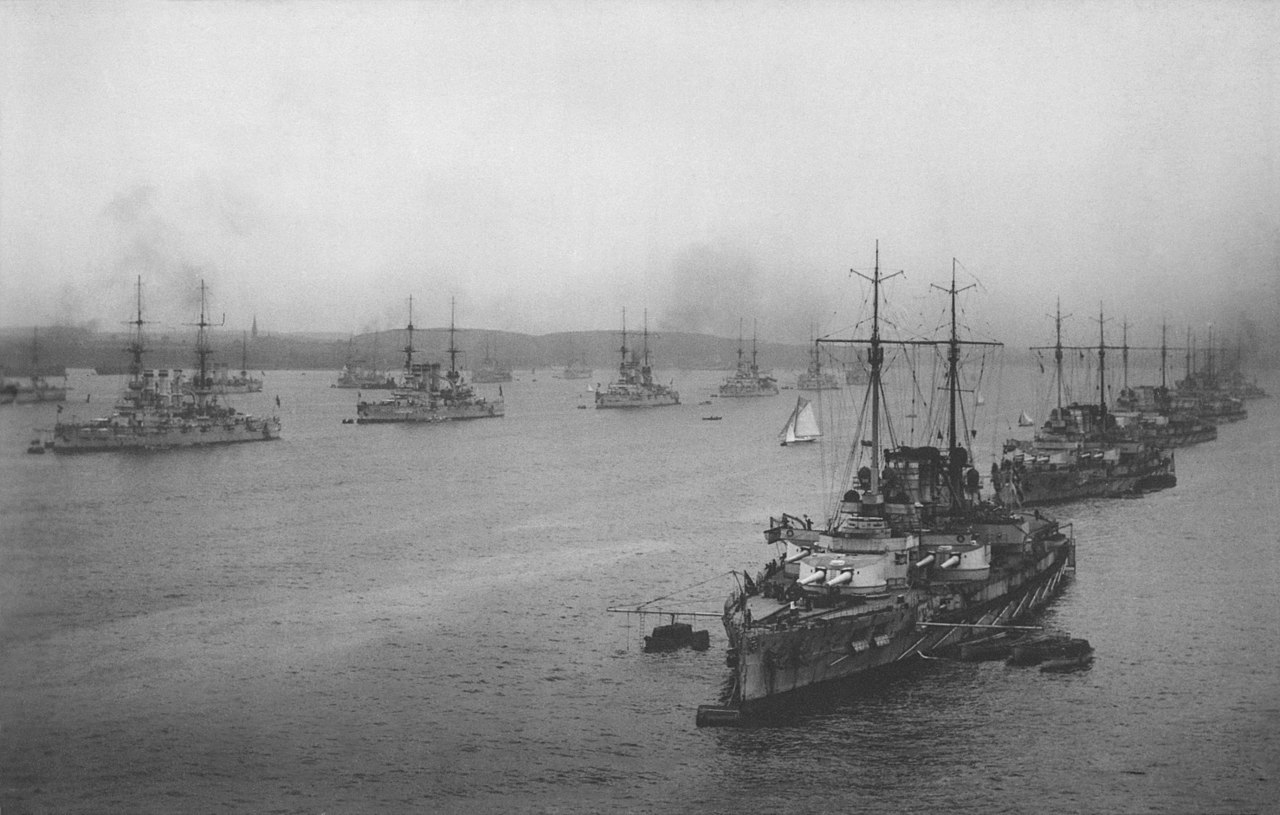
The High Seas Fleet in Kiel
The situation was made worse by the assignment of the best officers and men away from the battleships. The demands of the U-boat force drained many, and others were sent to minesweepers and destroyers. These officers worked much more closely with their men, and morale in these units remained high. Another factor was the nature of the German Navy. Unlike the RN, it relied heavily on conscripts, which robbed it of the long-service petty officers who formed the backbone of the British fleet. As a result of all these problems, the fleet was actively mutinous. The sailors had conducted a hunger strike and formed sailor's councils on each ship in June.2 A month later, the captain of the battleship Konig Albert drowned when he was pushed over the side while returning from a drinking session.
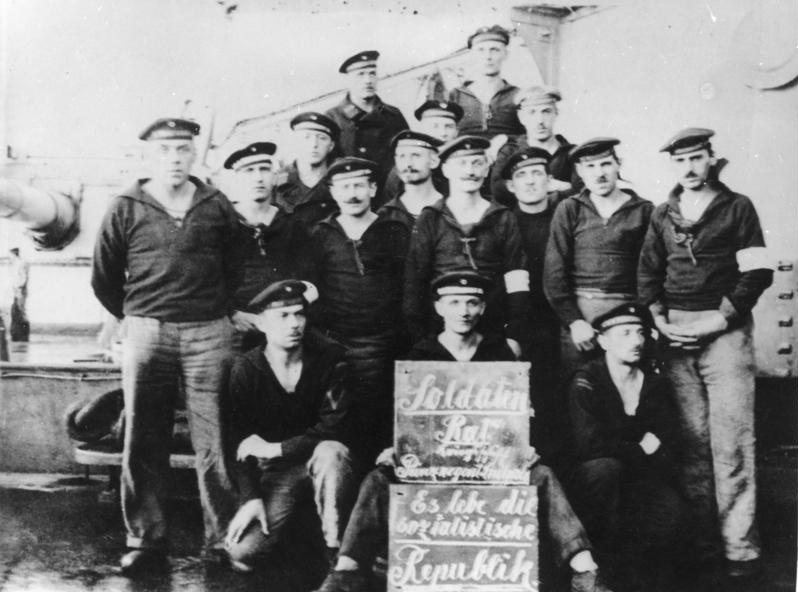
The sailor's council of Prinzregent Luitpold
On August 1st, the first full-blown mutiny broke out. 400 sailors from Prinzregent Luitpold went ashore to protest the bad food, short leaves ashore, and cancellation of a movie to allow infantry training. Eleven were arrested when they returned to the ship, and the fleet was in turmoil for the next three days. Finally, Scheer, the fleet's commander, ended the matter by sending Prinzregent Luitpold and Friedrich der Grosse, another center of unrest in the fleet, to Schillig Roads north of Wilhelmshaven. Two of the ringleaders, Albin Kobis and Max Reichpietsch, were executed, and many others arrested and sent either to prison or the Western Front. Things calmed down slightly, but the problems continued to simmer under the surface.
Matters came to a head a year later, in October 1918. By this point, the German position on the Western Front was collapsing, and Woodrow Wilson was asked to negotiate an armistice by the German government. One of his conditions was the immediate cessation of the U-boat attacks on merchant shipping, and on October 20th, the Germans agreed, recalling all the U-boats in the Atlantic the next day. The German Admiralstab saw an opportunity in the sudden availability of U-boats to support a fleet sortie, much as it had planned to do at Jutland, and quickly hatched a plan. The order to sail was issued on October 24th, 1918.
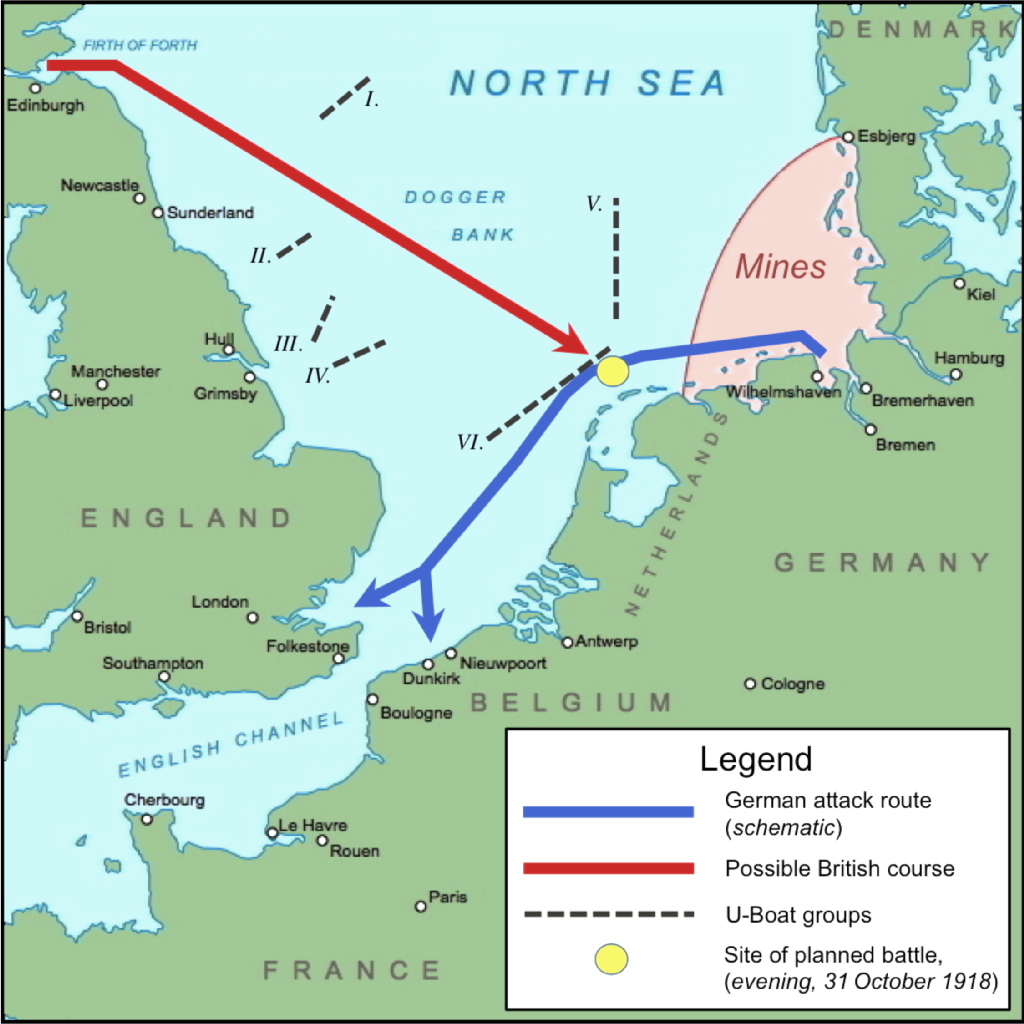
The German plan for the sortie
On the surface, the plan was fairly similar to those behind previous sorties into the North Sea. The High Seas Fleet would steam into the southern North Sea, an area known as the Hoofden, and its light cruisers and destroyers would raid the Belgian coast and the Thames Estuary on the morning of October 31st. The Grand Fleet would sortie in response, and on its way south, it would have to pass through newly-laid minefields and several lines of U-boats. The resulting attrition would weaken the Grand Fleet before its clash with the High Seas Fleet that night or the next morning.
But in one aspect, this plan was radically different. Scheer's main concern earlier in the war had been the preservation of the fleet, as expected by the Fleet in Being doctrine advocated by Mahan. He had turned back several times upon sighting the entire Grand Fleet, and when he was brought to battle at Jutland, his prime concern was escape. This time, he was inviting battle, despite odds that had turned significantly against him. He was outnumbered 15 to 35 in battleships and 5 to 11 in battlecruisers, while the odds at Jutland had been 16 to 28 and 5 to 9 respectively.3
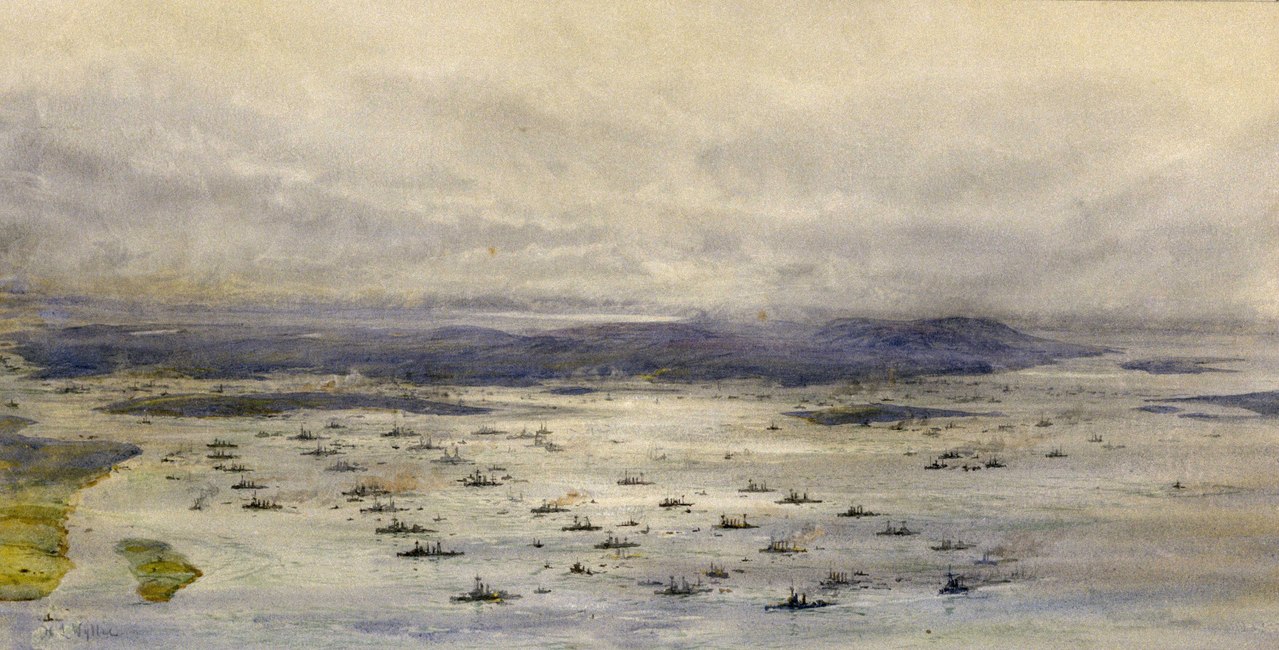
The Grand Fleet in Scapa Flow
As would probably be expected for a major decision involving the German Navy, the logic behind this is not entirely clear. Many accused Scheer and the fleet's officers of sailing to preserve their own honor in the face of the overwhelming Allied fleet. The reasons given by the officers themselves were closely related. Scheer claimed that not offering action would essentially destroy any chance of a future German fleet rising from the ashes, while even a glorious defeat would sow the seeds of a resurgent navy. Some held out hope of a tactical victory having an impact on the armistice negotiations, but this was unlikely in the extreme. Besides their numerical superiority, the British had resolved the two biggest issues which had bedeviled them at Jutland, inadequate ammunition safety and poor armor-piercing shells. There is even speculation by historians that the sortie was an attempt by the war party to sabotage the armistice.
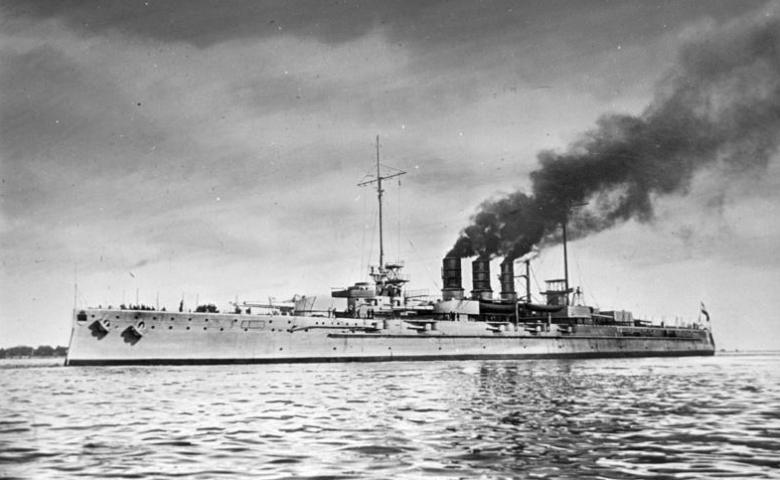
SMS Helgoland
In any case, the men of the fleet readily accepted the first explanation, and questioned why they should have to die for the honor of their officers in a war which had already been lost. When the fleet was ordered to raise anchor for Schillig Roads on October 29th, mass unrest broke out. Men refused to cooperate, and many cheered for peace and for Woodrow Wilson. Men did not return from shore leave, and had to be rounded up. The battleships Thuringen and Helgoland were seized by the mutineers, and only surrendered when confronted by destroyers and U-boats who remained loyal and threatened to sink them.
The British, thanks to their use of direction-finding and signals intelligence, were able to make a good guess of the German plan. Room 40 detected the formation of the U-boat lines, and the increased minesweeping activity to support the sortie, although they believed that the Germans would only come out long enough to transmit signals and lure the British out of their bases. Exactly what the British would have done had the Germans come out to fight is not entirely clear.
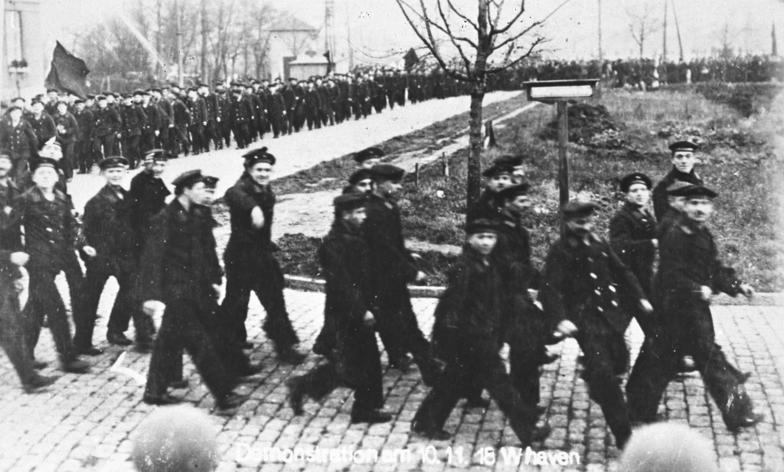
Sailors demonstrating in Wilhelmshaven
Hipper, who had taken over the fleet when Scheer was promoted, attempted to quell the unrest by dispersing the fleet among its different bases. The III Battle Squadron was sent to Kiel, on the Baltic coast of Germany, and arrests of suspected insurrectionists on the way there sparked another mutiny. The disobedience quickly spread ashore, and grew in scope from the release of the arrested sailors to an end to the war and improved food provisions. By November 4th, Kiel was firmly in the hands of the revolutionaries, followed by Wilhelmshaven two days later. This revolt quickly spread across Germany, ultimately leading to the Kaiser's abdication and the end of the war. The High Seas Fleet, still dangerous, was interned by the British at Scapa Flow, where it would play out the last act of the war.
1 The German designers apparently considered habitability to be of little importance. It was so bad that the British, when they finally got to inspect the ships, assumed that the crews had been intended to live in barracks ashore while in harbor. ⇑
2 This was very reminiscent of the events that lead up the Russian Revolution earlier in the year, and was almost certainly modeled on the Soviets which had effectively taken over that country. ⇑
3 It's possible that some of the British ships would have been in yard hands at the time of the sortie. This had reduced their strength significantly at Jutland. Also, the Spanish flu had started to badly affect the Grand Fleet around this time, and several ships were combat-ineffective for a few days. ⇑

Comments
Question re the picture of the Grand Fleet in Scapa Flow:
What was the sortie time for ships in anchorage or alongside when they didn't face a specific threat?
That is to say, if the Germans had sailed without tipping off the British and got within range of Scapa Flow unnoticed (say by sailing during a storm or something), how long would it take for the British fleet to be able to defend themselves meaningfully?
I don't know offhand, and I'm not sure what book would have the answer. That particular scenario is fairly unlikely, as the British coast was defended by more than just the battleships. Doing that sort of thing was fairly likely to see them tangling with destroyers or running into a minefield. And either of those options was far too likely, when any damage results in the ship probably being lost. The raids the Germans did make were on areas of the coastline that were lightly defended for exactly this reason.
@bean
This is all true, but if you're going to make a suicide run like Scheer was proposing, getting the British on their moorings seems like it at least gives you a better chance than when both sides are at sea and free to maneuver?
Ah. I see where you were going with this. I don't think that was particularly plausible. The whole premise of the operation was to use the U-boats to attrit the British fleet before the battle and U-47 aside, sinking battleships in harbor with submarines is easier said than done. The chances of catching them in harbor were probably too low. Weather forecasting has come a long way in the last century, and not giving somewhere like Scapa Flow a few hours warning would have taken incredible luck. And in that case, you just die.
'A mutiny against your orders turns into revolution that overthrows your government' has got to be '100' on the critical fumble table for military operations.
It's surprisingly common, actually. Once discipline starts to fray like that, it's really hard to stop. I believe something similar happened in Russia, and it's somewhat notable that the French mutinies didn't lead to a revolution.
France had three big advantages over Germany or Russia on the Revolution front:
France was already a fairly liberal republic by the standards of the day. The men who made up France's army were the same men who'd voted in their government, and they'd have the opportunity to vote in a different government in 1919. Russia, as an absolute monarchy, was at the other extreme, so a revolution was the only way to "vote" the Czar and his ministers out of office. Germany was somewhere in-between: there was a fairly liberally elected legislature (at the national level, at least: the Kingdom of Prussia's legislature was apportioned by taxable income), but the executive branch was directly accountable only to the Kaiser and the Chancellor. And I suspect mutinies are more dangerous to aristocratic social systems, since they tend to rely on a combination of habitual obedience and the threat of force to maintain power, so a large-scale mutiny is already most of the way towards overthrowing the regime.
France was fighting a defensive war on their own soil, and had relatively clean hands in terms of the war starting. A long, bloody war that's forced on you generally doesn't legitimize a regime the way a war of choice does. At least not unless the war crosses the line from "bloody stalemate" to "abject defeat".
France had enough food to go around, thanks to open sea lanes and British and American loans. Germany and Russia both suffered serious food shortages as the war dragged on, and there's nothing like an extended food shortage for driving the kind of desperate malcontentedness that drives revolutions.
All good points. I admit to mentioning that somewhat offhand. That said, Russia was theoretically democratic after the 1905 Revolution. In practice, it was still the most autocratic state in Europe, although Germany came close at times.